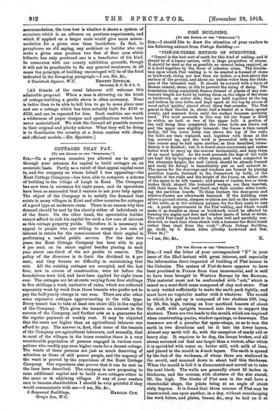COTTAGES THAT PAY.
[TO THE EDITOR Or THE "SPECTATOR."] Sin,—On a previous occasion you allowed me to appeal through your columns for capital to build cottages on an economic basis. Partly as a result of that appeal capital came in, and the company on whose behalf I was appealing—the Kent Cottage Company—has been able to complete a scheme of building in the village of Leigh in Kent. The Company has now been in existence for eight years, and its operations have been so successful that I venture to ask your help again. The object of the Company is to satisfy the demand that exists in many villages in Kent and other counties for cottages of a good type at moderate rents. There is no reason why this demand should be met by the charity either of individuals or of the State. On the other band, the speculative builder cannot afford to risk his capital for such a low rate of interest as this cottage property yields. Therefore it is necessary to appeal to people who are willing to accept a low rate of interest in return for the consciousness that their capital is performing a useful public service. For the last two years the Kent Cottage Company has been able to pay 4 per cent. on its share capital besides placing in each year about one-third of the net profits to reserve. The policy of the directors is to limit the dividend to 4 per cent., and they foresee no difficulty in maintaining that rate. All the existing cottages are occupied, and the last four, now in course of construction, were let before the foundations were laid, and have been applied for eight times over. The cottages are let at rents varying from four shillings to five shillings a week, exclusive of rates, which are collected separately week by week from those tenants who prefer not to pay the half-yearly charge in one sum. There are also other more expensive cottages approximating to the villa type. Every tenant has to take at least one share (£1) in the capital of the Company. This gives the tenants an interest in the success of the Company, and further acts as a guarantee for the regular payment of weekly rent. It may be objected that the rents are higher than an agricultural labourer can afford to pay. The answer is, first, that some of the tenants of the Company are agricultural labourers, and secondly, that in most of the villages in the home counties there is a very considerable population of persons engaged in various occu- pations who readily pay even higher rents for a decent cottage. The wants of these persons are just as much deserving of attention as those of still poorer people, and the urgency of the want is proved by the experience of the Kent Cottage Company. Our experience also proves that it can be met on the lines here described. The company is now proposing to raise additional capital and to build more cottages either in the same or in adjoining villages. If any of your readers care to become shareholders I should be very grateful if they would communicate with me.—I am, Sir, &c.,


















































 Previous page
Previous page